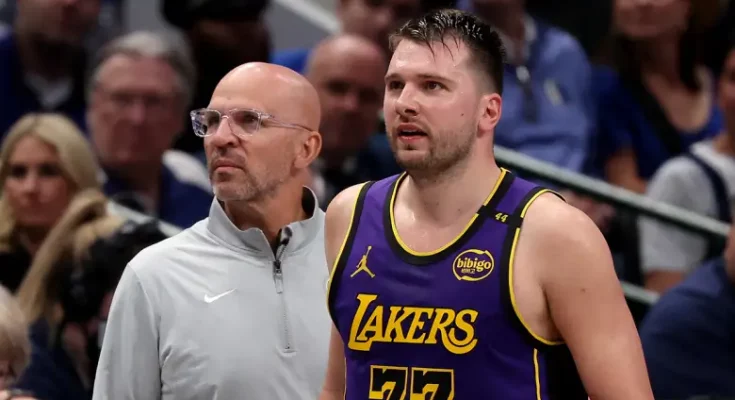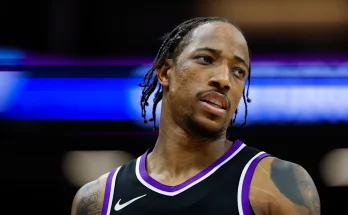Luka Dončić’s recent dramatic weight loss has captured the attention of NBA fans, analysts, and insiders alike. Beyond the obvious physical transformation, this change sheds light on deeper, more uncomfortable truths about the Dallas Mavericks organization and the challenges they face moving forward. While many see Luka’s physical shift as a positive step toward improving his performance and longevity, it also signals underlying issues within the team’s structure, culture, and strategy that must be addressed if the Mavericks want to compete at the highest level.
Luka Dončić entered the NBA as a prodigy, quickly establishing himself as one of the league’s brightest stars. His blend of size, skill, and basketball IQ made him a dominant force almost immediately. However, like many young stars, his physical condition fluctuated during his early years. Weight management became a topic of discussion, as pundits debated whether a leaner Luka would be more effective or if his bulk contributed to his strength and ability to absorb contact.
The recent reports and images showing Luka’s substantial weight loss indicate a conscious effort to enhance his conditioning. Players often undergo such transformations to improve stamina, speed, and injury prevention. Yet, with Luka, this physical change is more than just about health or performance; it reflects the intense pressure and expectations he carries as the undisputed leader of a franchise that has struggled to build a consistent championship contender around him.
The Mavericks, despite their talent-laden roster, have encountered a series of setbacks over the past seasons. Coaching changes, roster instability, and chemistry issues have hampered their progress. Luka’s weight loss comes at a time when the team is facing critical decisions about its future direction. The urgency to maximize his prime years has never been more pronounced. This transformation, therefore, is a visible sign of the immense responsibility Luka feels—not just to perform but to carry the entire franchise on his shoulders.
The physical toll on Luka is indicative of the broader systemic challenges within the Mavericks. One of the most glaring issues is the lack of a reliable supporting cast capable of complementing Luka’s unique playing style. While the team has invested in several high-profile players, consistency has been elusive. Injuries, mismatched skill sets, and underperformance have left Luka as the primary offensive and defensive option game after game. The weight loss could be seen as a preparation for the increased physical demands this role requires.
Moreover, Luka’s conditioning transformation points to the psychological and emotional strain he endures. Elite athletes understand that body and mind are intertwined. When a player makes such a significant lifestyle change, it often mirrors an internal desire for control amidst chaos. Luka’s dedication to reshaping his physique suggests a commitment to overcoming external challenges—whether it be skepticism from critics, pressure from fans, or instability within the Mavericks organization.
Another uncomfortable truth revealed by this weight loss is the glaring spotlight on the Mavericks’ front office and management. For years, critics have questioned the team’s ability to build a championship-caliber roster around Luka. Draft picks, trades, and free-agent acquisitions have not consistently delivered the complementary talent needed to push Dallas beyond the second round of the playoffs. The pressure now intensifies for the front office to act decisively, as Luka’s prime years are finite.
The Mavericks’ struggles also highlight the evolving nature of the NBA and how teams must adapt. The league increasingly values versatility, pace, and shooting—traits that Luka embodies. Yet, Dallas has sometimes seemed reluctant to fully embrace modern basketball trends, opting for roster construction that doesn’t maximize Luka’s strengths. His weight loss may symbolize a readiness to evolve individually, but it also exposes the team’s lag in collective evolution.
Furthermore, Luka’s transformation raises questions about the sustainability of the Mavericks’ current culture. Championship teams often thrive on a balance of star power, depth, veteran leadership, and a winning mentality. While Luka’s individual work ethic and talent are unquestioned, the surrounding environment must support and amplify his efforts. The physical changes he’s made underscore the absence of a stable, winning culture that nurtures holistic team development.
The scrutiny on Luka also magnifies the issue of health and durability. Previous seasons saw the Mavericks suffer from injuries to key players, limiting continuity and progress. Luka himself has battled minor injuries, which weight loss and improved conditioning aim to mitigate. Still, this places added pressure on the team’s medical and training staff to maintain peak player health through innovative and proactive measures.
On a broader scale, Luka’s weight loss and the surrounding discourse serve as a microcosm of the high-stakes environment of professional basketball. Every move, both on and off the court, is analyzed and dissected. For the Mavericks, this means that no detail—be it player fitness, roster moves, or coaching decisions—can be ignored. Luka’s physical transformation forces the organization to confront uncomfortable questions about their ability to compete against better-prepared and more cohesive teams.
The narrative surrounding Luka’s weight loss also touches on the mental health aspects of elite athletes. The pressure to perform at an All-NBA level while carrying the hopes of a franchise and its fanbase can lead to significant stress. The dedication to improving his body could be a form of coping mechanism or a way to regain confidence and agency. It’s a reminder that professional sports are not just about skill but also about resilience and mental fortitude.
Looking forward, Luka’s physical transformation could become a catalyst for positive change within the Mavericks. If embraced correctly, it may inspire a renewed team-wide commitment to excellence and professionalism. It also places the spotlight on the team’s leadership to provide the resources, strategy, and support necessary to capitalize on Luka’s prime.
However, the Mavericks must move quickly. The NBA landscape is fiercely competitive, with rival teams continuously improving. Luka’s improved conditioning might give Dallas a competitive edge, but only if matched by savvy roster moves, strategic coaching, and a unified organizational vision. Failure to act on these fronts could mean that Luka’s physical sacrifices end up being for naught.
In conclusion, Luka Dončić’s dramatic weight loss is far more than a personal fitness milestone. It exposes several uncomfortable truths about the Dallas Mavericks’ internal struggles, the pressures on their star player, and the urgent need for organizational transformation. As Luka reshapes his body to meet the demands of the NBA’s grueling schedule and heightened competition, the Mavericks must also reshape their approach if they hope to fulfill the lofty expectations placed on their young superstar. The path ahead is challenging, but Luka’s dedication offers a glimmer of hope that with the right moves, Dallas can turn struggle into success.



